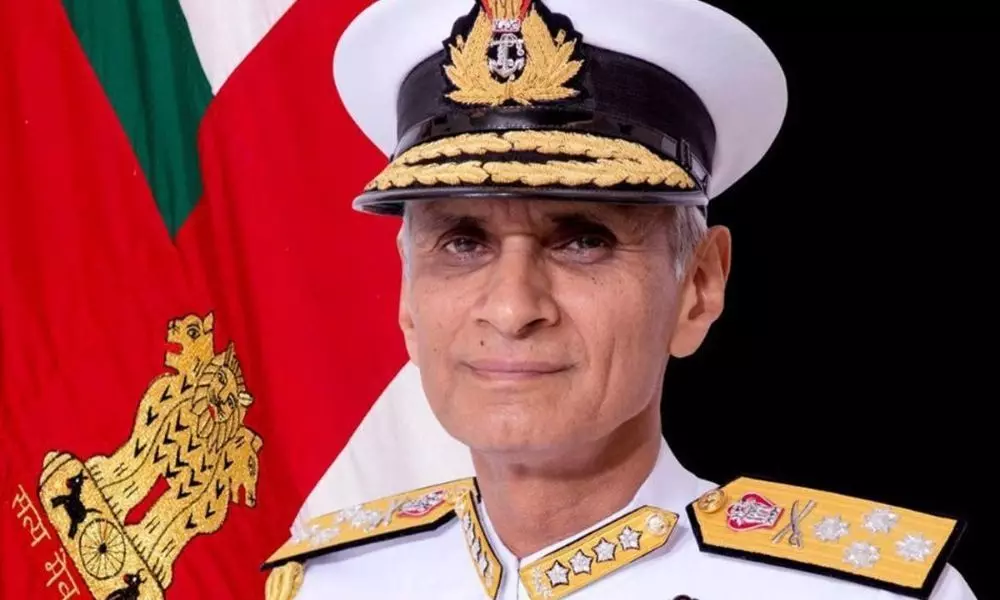Live
- The importance of regular mental health screenings for seniors: Emphasizing early detection and intervention
- Voters Reject Dynastic Politics in Karnataka: Raja Mannar
- How Many Almonds Are Too Many? Ideal Daily Intake Explained
- Sony LIV's Freedom at Midnight received a thumbs up from author Tushar Gandhi, great-grandson of Mahatma Gandhi
- Fraud Awareness Week: LinkedIn shares tips and tools to safeguard job-search experience
- Hyundai Motor India Foundation inaugurates Gurugram's first ever Traffic Engineering Centre under its Easy Roads initiative
- QualiZeal Launches QMentisAI at QE Conclave: Shaping the Future of Quality Engineering with AI
- Six injured in five-vehicle crash in Japan
- The Bougainvillea Restaurant Introduces Exquisite New Menu to Celebrate Culinary Evolution
- With Priyanka Gandhi’s poll victory, three members of Gandhi family now in Parliament
Just In
India engaging with nations at strategic level in Indian Ocean Region: Navy Chief


India engaging with nations at strategic level in Indian Ocean Region: Navy Chief
India is actively engaging with nations at the strategic level in the Indian Ocean Region (IOR) -- one of the most militarised regions -- under the ambit of government initiatives, Indian Navy Chief Admiral Karambir Singh said on Friday.
New Delhi: India is actively engaging with nations at the strategic level in the Indian Ocean Region (IOR) -- one of the most militarised regions -- under the ambit of government initiatives, Indian Navy Chief Admiral Karambir Singh said on Friday.
The government has various initiatives such as the Act East Policy, Association of Southeast Asian Nations, ASEAN Defence Ministers' Meeting Plus (ADMM+), and Indian Ocean Rim Association, among others. Recently, India became an Observer in the Indian Ocean Commission (IOC) and the Djibouti Code of Conduct (DCOC).
"These provide a framework for meaningful and constructive dialogue and also forms the basis for enhancing the Navy's engagement with like-minded maritime nations," said Admiral Singh in his address at the National Defence College National webinar.
He said that at the Indian Ocean Region (IOR), the ongoing geo-political interactions and engagements have a cooperative, as well as a competitive connotation.
Cooperative connotation emerges from the fact that, while land borders tend to divide, the medium of the sea unites. Most nations have a core interest in keeping the seas free for commerce, focussed on assuring greater prosperity for its citizens.
He said that the Indian Ocean Region offers several collaborative opportunities - Blue Economy, resources, connectivity and trade - but also has threats that are trans-national in character.
"Drugs, piracy, terror, illegal, unreported and unregulated fishing and climate change. Given the expanse of the IOR, there is a recognition that no one country can do it alone. Therefore, there is a need to work together," he said.
Talking about competitive connotation, he said that there are several inter-state conflicts where problems on land spill over to the sea, examples are Somalia, Yemen and the Strait of Hormuz.
Further, Admiral Singh pointed out that IOR is also one of the most militarised regions, and at the same time one of the less integrated regions.
Also, there are differing interpretations of international laws and there is this fear that 'Global Commons' can change to 'Contested Seas', threatening free flow of commerce and trade.
In managing this contrasting canvas, India has adopted the vision of Security and Growth for All in the Region (SAGAR), said Admiral Singh, adding that the acronym encapsulates not only the aspect of security, but also encompasses the constructive, cooperative and collaborative essence of our engagement.
Indian Navy, as the primary manifestation of India's maritime power, is at the forefront of executing this vision in the maritime domain.
He pointed out that Indian Navy has three primary 'Lines of Effort'. The first is collaboration and cooperation; second, enhancing positive influence in the region; and third, enhancing reach and sustenance in the farthest corners of our areas of interest.
These Lines of Effort are driven by a commonality of purpose with like-minded maritime nations, and are focussed towards pursuance of our overall national and regional maritime objectives.
"We have adopted a pragmatic and outcome based strategy, rather than a purely conceptual one," said Admiral Singh.
Charting India's Maritime Security, the three Lines of Effort, Singh said, are underpinned by a five-pronged approach, or five pillars.
"This is best represented by the acronym 'TIDES', which correlates to SAGAR and encompasses T - Trust; I - Interoperability; D - Domain Awareness; E - Enhanced Engagements; and S - Secure Seas," he said.
Talking about the budget constraints the force is facing, he said, "We all know that military planners will seldom have all the resources they need. Indian Navy is no exception, but we are always ready and willing to share what we have for the benefit of our maritime neighbourhood."
He also said that Indian Navy, operating farther and outward from Indian shores, in step with India's national interests, is a strategic imperative and necessity.

© 2024 Hyderabad Media House Limited/The Hans India. All rights reserved. Powered by hocalwire.com






